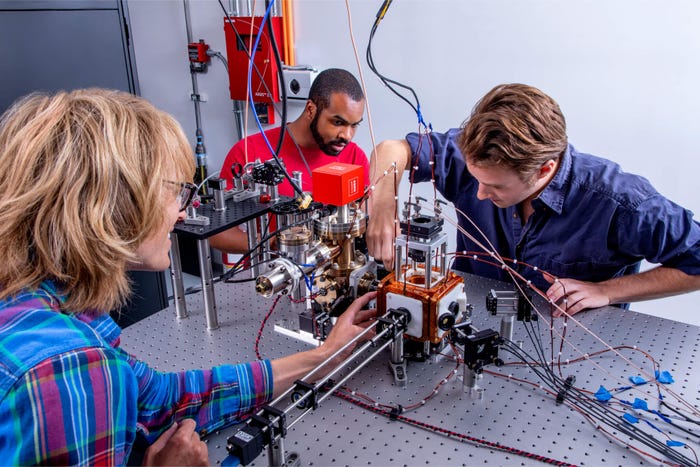
Connects decision-makers and solutions creators to what's next in quantum computing
Why Supercomputing Centers Are Installing On-Site Quantum ComputersWhy Supercomputing Centers Are Installing On-Site Quantum Computers
Q&A with QuEra’s Yuval Boger

In April, QuEra Computing was awarded a $41 million contract by Japan’s National Institute of Advanced Industrial Science and Technology (AIST) to deliver a neutral-atom quantum computer.
The computer is being installed on-premises alongside the Nvidia-powered ABCI-Q supercomputer by 2025 as part of Japan’s national initiative to advance its quantum computing capabilities.
In this Q&A, QuEra’s chief marketing officer Yuval Boger discusses the growth in supercomputing centers installing quantum computers for hybrid operations and what this means for the future of AI.
Enter Quantum: AIST is installing a QuEra quantum computer on-site alongside its ABCQ-I supercomputer. What is the significance of having it in the same location rather than accessing quantum processing power via the cloud?
Yuval Boger: I think if you had spoken with me two or three years ago about on-premise quantum computers I would have asked what have you been smoking? That's no longer the case.
People want to buy quantum machines on their premises for several reasons. One is control over who's using it and how jobs are prioritized.
I was speaking with a pharma company recently and said quantum computers are not that useful yet, why do you need them on-prem? They said we've been burned by the GPU craze, you know, we can never get enough GPUs on the cloud and if something is mission-critical, we need some capacity.
Similarly, BMW published a paper a few months ago that involved running algorithms using our machine that's on AWS’s Braket cloud computing service. I think it was five jobs of 10 hours each, so if you were in the queue, you would have to wait. Those examples speak to control.
The second issue is data residency. Whether it's European GDPR or sensitive information, if it's going to the cloud where exactly is it?
The third thing that people care about is latency, especially when they carry out hybrid quantum-classical jobs. If you have to go from one side of the world to the other, that adds up to the cycle time.
The fourth factor is prestige. National quantum programs such as the U.K.’s program, for instance, say no way are we having the computer in Boston, you’ve got to have it in the U.K. When you have a computer on-site, that attracts researchers and grant funding.
National programs aren’t just buying a computer, they’re growing a quantum program and the germination of a local ecosystem. Sometimes they want to put up a quantum accelerator so that startup companies go and are there and to jumpstart the startup economy.
One of the key goals of Japan's national quantum program is to use quantum to supercharge AI. What does quantum bring to AI that just throwing more GPUS at it doesn’t?
Several quantum algorithms in machine learning seem to perform at least as well or maybe better than classical algorithms. One thing that has always been the case with quantum computers is that you need to think about programming them differently than classical computers.
Some of the work that we're doing at QuEra for instance, there's an algorithm called quantum reservoir computing. We're running algorithms with more than 100 qubits that can’t always be simulated on a classical computer and we're getting some fantastic results.
Part is just exploration. How would you know whether you can fly transatlantic if you don’t have a plane to try it with?
What differences has QuEra observed between the different national quantum programs?
The main difference between them is the grade of nationalism. The German program only uses German manufacturers and if you want to be considered you have set up an office in Germany and it may be worth it as these are large contracts.
The French program has invested 500 million euros over 10 years. It feels to me almost like a central planning economy with five companies using superconducting, photonic and trapped ion technologies to make sure all options are covered. Well, we'll see if it works better than the other central planning economies we've seen in history.
The UK program is I think more forward-thinking, striking the balance between those approaches. UK quantum technology is fantastic, but there's innovation from other parts of the world, too.
The aim is to germinate and strengthen the U.K. ecosystem so the program requires that at least 50% of the innovation happens in the U.K. If you just need to buy a laser and it's an off-the-shelf laser, you can buy it from anywhere you want.
But if you're developing algorithms or a new type of camera, they want it done in the U.K. and that encourages companies like QuEra to find U.K. partners and split the innovation. In our case our partner was Riverlane.
Read more about:
AsiaAbout the Author
You May Also Like






